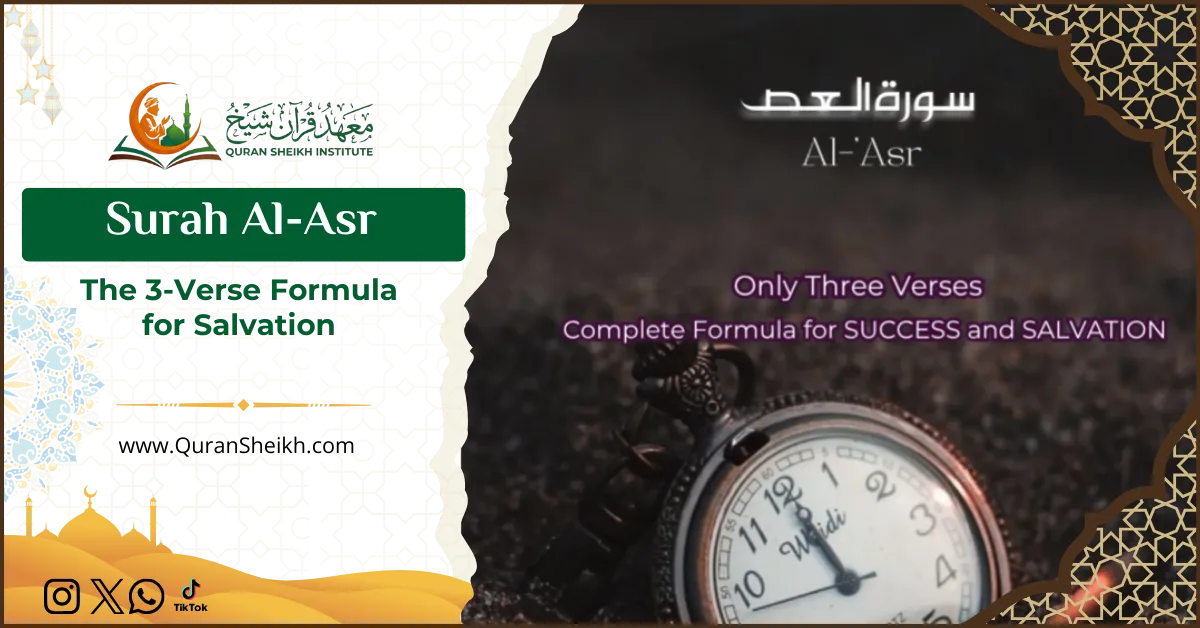Introduction: The Most Valuable Thing You Are Losing Right Now
Every second that passes is a moment you can never get back. We are all in a race against time, and in this race, our default state is one of “loss.”
Allah, in His infinite wisdom, swears by this very concept—Time—to deliver the most concise and complete formula for success ever revealed. Surah Al-Asr (The Declining Day) is the 103rd chapter of the Quran. At only three verses, it is the second shortest Surah, yet it is so comprehensive that the great scholar Imam Shafi’i (ra) said: “If the people only considered this Surah well, it alone would suffice them for their guidance.”
What is this profound formula? This Surah is not just a chapter; it is a complete “life-plan” that separates the winners from the losers in the context of eternity.
Listen to Surah Al-Asr: Recitation by Sheikh Mishary Rashid Alafasy
Listen to this beautiful recitation to perfect your pronunciation and reflect on the meanings before reading the explanation.
The Anatomy of the Formula: Understanding the 3 Verses
The Surah begins with an oath, identifies a universal problem, and then provides a complete, four-part solution.
Verse 1: Wal ‘asr (By time,)
- The Contemplation (The Oath): Allah begins by taking an oath on “Time” itself. Why? To alert us to the value of what is being discussed. Time is the “capital” of your entire life. It is the one resource that is always decreasing and can never be replenished. By swearing by it, Allah is telling us to “pay attention,” because what He is about to say is as serious and real as the relentless passage of time.
Verse 2: Innal insaana lafee khusr (Indeed, mankind is in loss,)
- The Contemplation (The Problem): This is the default state of humanity. “Khusr” means “loss” or “bankruptcy.” It’s not just a financial loss, but a total spiritual loss in the Hereafter. Allah is stating that all of mankind is in a state of loss, except…
Verse 3: Il lal lazeena aamanu… (Except for those who…)
- The Contemplation (The 4-Part Solution): This final verse gives us the only exception to the rule of “loss.” It is a complete program for success, consisting of four essential conditions:
1. “Have believed” (Aamanu): This is the foundation. It is not just saying “I am a Muslim.” It is a deep, firm belief in Allah, His attributes, the Last Day, the Books, and the Prophets. This Iman (faith) is the “why” that fuels everything else.
2. “And done righteous deeds” (‘Amilus Saalihaat): This is the proof of belief. Faith is not passive; it is action. “Righteous deeds” are any actions that align with the Quran and Sunnah. As the Prophet (ﷺ) said, “Righteousness is good behavior.” This is your personal, individual application of your faith.
3. “And advised each other to truth” (Wa tawa saw bil Haqq): This is the social dimension. Faith is not lived in isolation. After believing in the “Truth” (Al-Haqq) and acting on it, you have a duty to advise others to it—your family, your friends, your community. This is da’wah (invitation) and gentle advice.
4. “And advised each other to patience” (Wa tawa saw bis Sabr): This is the method. Why is this condition last? Because when you fulfill Condition 3 (advising to the Truth), you will inevitably face hardship. You will face resistance, mockery, and personal struggles. “Patience” (Sabr) is the fuel that allows you to remain steadfast in your own deeds (Condition 2) and in your advising of others (Condition 3).
The Smart Bridge: From a Simple Recitation to a Life’s Guiding Principle
The statement of Imam Shafi’i—that this Surah is “enough”—is profound. It’s because these four conditions cover our entire existence:
- Our relationship with Allah (Iman).
- Our personal actions (Righteous Deeds).
- Our duty to society (Advising to Truth).
- The character required to do it (Patience).
But how do we know what “Al-Haqq” (The Truth) is? How do we know which deeds are “Saalihaat” (Righteous)?
The answer is only through the deep, authentic study of the Quran. A simple translation can tell you the words, but it cannot give you the deep Tafseer (explanation) and Fiqh (understanding) needed to live by them.
This is the bridge between knowing the Surah and living it. At Quran Sheikh online Quran learning, our expert, one-on-one tutors are dedicated to helping you build this deep understanding. We guide you beyond the surface, so you can truly grasp the “Truth” that this Surah commands you to live by and advise to.
Your Daily Assessment: Are You in “Loss” or “Success”?
Surah Al-Asr is not just a Surah to be recited; it is a “checklist” for your daily self-assessment.
At the end of each day, as “Time” has passed, we can ask ourselves:
- Did I strengthen my Iman today?
- Did I perform Righteous Deeds?
- Did I gently advise anyone to the Truth?
- Did I practice Patience?
If the answer is yes, you are not in “loss.” You are on the path to eternal, abundant success.
For Reference: Transliteration and Translation
Wal ‘asr (By time,)
Innal insaana lafee khusr (Indeed, mankind is in loss,)
Il lal lazeena aamanu wa ‘amilus saali haati wa tawa saw bil haqqi wa tawa saw bis sabr (Except for those who have believed and done righteous deeds and advised each other to truth and advised each other to patience.)
Frequently Asked Questions About Surah Al-Asr
[rank_math_rich_snippet id=”s-0c66b8ac-c5e2-4ce7-a1b4-7f090aea6805″]










